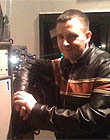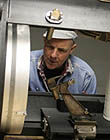|
|
 
|
|
Author
|
Topic: When Late Night Television Brought Bad Movies Into The Mainstream
|
Harold Hallikainen
Jedi Master Film Handler
Posts: 906
From: Denver, CO, USA
Registered: Aug 2009
|
 posted 11-03-2017 12:43 PM
posted 11-03-2017 12:43 PM





http://uproxx.com/tv/how-late-night-took-bad-movies-mainstream-late-night-comedy-week/3/
Did people always know bad movies were bad? It’s a question that haunts any serious explorer of film history’s seedier byways and alleyways. It’s hard to imagine anyone ever watching Plan 9 From Outer Space or Robot Monster — the one you see in memes of a guy in a gorilla suit wearing a 1950s space helmet — or even Ballistic: Ecks vs. Sever with a straight face, thinking, “Yes, this is good.” But of course we can’t imagine that; we live in a super-smart, super-self-aware future, in which cinematic embarrassments have long been held up as figures of fun. We’ve turned bad cinema into a cottage industry, crafting an alternative to the hallowed film canon, where doozies like Reefer Madness and The Room are as cherished, in their ways, as Citizen Kane and Moonlight.
But where did this idea come from — that some of us, sometimes, if we’re being perfectly honest, may endlessly rewatch something bad rather than something respectable? It’s not a modern concept; the consumers of long ago weren’t idiots. In fact, you can lay most of the credit for the popularization of bad movie love on another medium entirely: television. Specifically, you can blame it on old late-night TV.
While today’s after-hours programming is largely devoted to talk show cut-ups, in the good ol’ days the field was more diverse. You could also watch crappy movies (though they might turn out to be diamonds in the rough). And those crappy movies/maybe masterpieces were often presented by hosts. And those hosts were often smart enough to know those crappy (or secretly great) movies were sometimes so bad they were good — this, decades before apathetic, flannel-wearing know-it-alls began misusing the word “ironic.”
Bad movie love didn’t actually start there. According to critic J. Hoberman — in his indispensable 1980 Film Comment article called, simply, “Bad Movies” — the first people to openly treat incompetence seriously were the artsiest of them all: the surrealists. André Breton liked to theater-hop, bouncing as soon as the plot of one movie started to make sense and wandering into another mid-film, then another, then another — piecing together his own fractured, absurdist opus from random detritus. Avant-garde filmmaker Jack Smith (Flaming Creatures) was second to none in his love of Maria Montez, the cringiest Hollywood star of the ’50s. It took great artists to find the sublime in the bad, or the simply cheap, or the indifferently or cynically made.
The surrealists were only recommending bad movies to each other and their ilk. It took TV hosts to spread the gospel to every household. In the early days of television, studios and archives would sell giant packages of movies to stations, to fill out all that air time they could never cram with only original programming. Aired when all but the most disreputable were in bed, these movies weren’t always the cream of the crop; they tended to be the forgotten, the disposable: cheapie horrors, tacky sci-fis, shruggy swashbucklers, gutter noirs. Some of the craftier stations hired hosts to introduce them — and, more often than not, gently (and sometimes not so gently) mock them a little, too.
The first big horror show host was Vampira, aka Maila Nurmi. An aspiring actress, Nurmi was working as a hat-check girl when she landed a gig at L.A.’s KABC-TV in 1954. The station was starting a horror movie show, and its producer had spotted her at a costume party in an outfit inspired by Morticia Addams. Next thing Nurmi knew, she was spending her nights in a figure-hugging black dress — a goth goddess slinking through fog and delivering, via a husky come-on voice, tongue-in-cheek intros to deep cut Bela Lugosi randos like The Corpse Vanishes. On The Vampira Show, Nurmi was both above it and definitely into it. Like the surrealists, she knew that cheesiness, incompetence, bad-ness could be magnificent, too.
The Vampira Show only lasted a season before it was unceremoniously canceled. But from its grave rose a Romero zombie army of copycats. From the ’50s through the ’70s, horror hosts sprouted up across the nation. They all had funny names. It’s hard to beat Chicago’s Svengoolie — first essayed by Jerry G. Bishop and, since 1979, by Rich Koz — but Sir Graves Ghastly (from Detroit) and Count Gore de Vol (from D.C.) are nothing to sneeze at. One of the legends of horror hosting didn’t need a funny name. He was Zacherley, the professional name of one John Zacherle, whose look was an ashen ghoul, beaming diabolical pronouncements first from Philadelphia, then in New York City. Even Australia got in the fun; a host named Deadly Earnest presented Aweful Movies, which ran from 1966 to 1972.
But time is cruel even to the hip. By the early ’80s, the campy horror host had become as kitschy as the movies they were showing. The profession needed to go next level. Enter Elvira, aka Cassandra Peterson. Before the red-headed Peterson became the black-mega-beehived Mistress of the Dark at age 30, she’d already led a life worthy of a picaresque movie. She was an underage Vegas go-go dancer. She lost her virginity to Tom Jones. She tried to become a singer after Elvis Presley told her she had a nice voice. During a stint in Italy, she caught the eye of Federico Fellini, who thought she resembled his wife, Giulietta Masina, when she was younger; her reward was a bit part in his 1970 opus Roma. She or may not be on the cover of Tom Waits’ 1976 album Small Change, nude except for skivvies and nipple tassels, but to this day she can’t remember if that’s really her.
By 1979, Peterson had reinvented herself yet again, this time as a comic actor, joining up with the storied L.A. improv troupe the Groundlings, in the era of Paul Reubens and Phil Hartman. One of her popular characters was a Valley Girl — an act that would wind up as the prototype for Elvira. Around this time, KHJ-TV in Los Angeles was looking to revive its own defunct horror show Fright Night, whose host, Larry Vincent — otherwise known as Sinister Seymour — had died in 1975. Initially, the plan was to bring back Maila Nurmi, whose post-Vampira Show career had proved rocky. At her lowest ebb, she’d crossed over from host of cheesy movies into the ultimate bad movie itself: Ed Wood’s Plan 9 From Outer Space, in which she was even credited as Vampira, thus damaging the brand forever.
Details are fuzzy on what happened next. Either Nurmi left over creative differences, or she stormed off after the producers replaced her with Peterson behind her back, then retitled the show Elvira’s Movie Macabre. Whatever the case, Nurmi sued Peterson for copying her shtick. Nurmi lost, and for good reason: Elvira wasn’t really a copy. She was similar in some ways but strikingly different at heart. Vampira was cold, borderline menacing; Elvira was flirty, gabby. If Vampira was Marlene Dietrich, Elvira was Mae West.
With her blinding cleavage and endless double entendres (“I put the ‘boob in boob tube!’”), Elvira was (and is) a flamboyant exaggeration of femininity. Though Peterson’s creation was rebelling against an age of conformity and family values — Elvira was a cool outsider and a woman who openly liked sex, or at least winking about it — she was still perfect for the Reagan era and its obsession with size, as well as with branding. Elvira lives on today, in part because Peterson has been as sly a businessperson as she was skilled a performer. Movie Macabre only lasted five seasons, but Peterson was able to “vertically integrate.” Elvira invaded talk shows (she held her own with Joan Rivers on The Tonight Show and flirted with Alan Thicke), TV dramas (she danced with Erik Estrada on CHiPs), even the multiplex (1988’s Elvira: Mistress of the Dark, where she runs afoul of the Puritans of a town called Falwell, nudge nudge). Today, you can buy Elvira costumes and Elvira jewelry and Elvira Funko Pop dolls. The 60-something Peterson may be trying to retire Elvira for good, but as a consumer product, she may last as long as pumpkins and Boris Karloff.
Elvira was so big that the movies on Elvira’s Movie Macabre took second place to the show’s va-va-voom host. Even when the films were better than trash — the Vietnam War zombie grinder Deathdream, Roman Polanski’s The Fearless Vampire Killers, Michael Powell’s genuinely great Peeping Tom, even Peterson’s own favorite horror film, Night of the Living Dead — viewers were still instructed to treat them as mere comfort food. You weren’t supposed to notice when they had true craft or deeper nuances. The downside of TV horror shows is they unwittingly flattened out their films, treated even the best of them as though they were generically spooky kitsch.
You were even invited to laugh at them, too. By the ’80s, chuckling at old, cheesy old movies had become the thing to do. This evolution in audience thinking was partly thanks to horror show hosts. It was also thanks to, of all people, right-wing movie critic Michael Medved.
Medved began his career as a speechwriter and consultant for Democrat candidates; later he wrote about politics, all while becoming increasingly conservative. He also loved bad movies. Along with his brother Harry and Randy Dreyfuss, he wrote the 1979 bestseller The Fifty Worst Films of All Time. Along with its follow-up, The Golden Turkey Awards, the Medveds went one further than old horror show hosts. Their books put the likes of Robot Monster and Blackenstein and the all-little person Terror of Tiny Town, well, into the books. They were the first ones to name the forgotten Ed Wood as the “Worst Director of All Time.” The Medveds tirelessly prowled through cinema’s lower depths and came back with an alternate history, reminding people, for instance, that the mighty Robert Mitchum also starred in Matilda, a 1978 film about a boxing kangaroo.
Michael Medved wouldn’t put his name on Fifty Worst Movies; after all, he was a serious writer. But once it sold like hot cakes, he changed his mind. If you grew up in the U.K., maybe you watched Medved’s 1983 late-night movie show, The Worst of Hollywood, on Channel 4. Medved didn’t dress up in a ghoulish costume — perhaps he realized that a right-wing movie critic was far scarier than Vampira — and he wouldn’t do a cute, pun-ny little intro. Instead, he barreled through a full ten-minute opening barrage, mercilessly laying into the night’s offering, be it Plan 9 or They Saved Hitler’s Brain or Santa Claus Conquers the Martians.
But Medved was different from Elvira and Zacherle and even the surrealists in another key way: He was mean. Other hosts presented their films with a balance of smart-aleck condescension and legitimate affection. Though he was a far more rigorous historian than any of them, Medved treated the films as though they had simply been made by blithering idiots, worthy of scorn, ripe for humiliation. When introducing the ridiculous South Seas saga The Wild Women of Wongo on The Worst of Hollywood, he gleefully pointed out that one actress had become a waitress. But what would you expect from someone who switched to the Republican party after meeting Dick Cheney? (The Medveds also had terrible taste. Fifty Worst Films included Last Year at Marienbad and Ivan the Terrible, as well as Bring Me the Head of Alfredo Garcia and Zabriskie Point — easily hated films maudits that were piled on upon release but have since been reclaimed by more discerning viewers. Good time to mention that, years later, a gushing Michael Medved quote found its way onto the video box for Batman and Robin?)
Horror show hosts and the Medveds paved the way for what’s become a full-blown bad cinema industry, which ballooned even further in the ’80s and ’90s. You can see their influence on Mystery Science Theater 3000, which went even further than the Medveds: the curios they exhumed were even more obscure. (Though Team MST3K treated them with far more affection.) You can see it in the career of Joe Bob Briggs, aka John Irving Bloom, whose fun-lovin’ redneck character hosted Drive-In Theater on TMC and later MonsterVision on TNT.
From 1989 through 1998, USA Up All Night devoted two whole evenings — into the wee hours of Friday and Saturday — to genre trash. The cable giant showed everything from The Toxic Avenger (from the self-aware camp gorehounds at Troma) to Nightmare on Elm Street to House Party to absolute obscurities. Between commercial breaks, hosts Gilbert Gottfried, Caroline Schlitt and Rhonda Shear did wacky sketches that were loose, cheap and hastily thrown together. (Still, props to the delightfully game Shear, who, in a 1993 episode, somehow got Max von Sydow to pop up in one of her bits.)
Of course, today you don’t turn on the television — or, perhaps, even fire up Netflix — to watch movies. You learn about cinematic turkeys on the internet, from endless listicles and jokey podcasts like How Did That Get Made? and The Flop House. Chuckleheads are always on the hunt for the next Worst Movie Ever. At one point it was Troll 2. Then it was The Room. The king is still The Room, though there are always noble seekers of the throne, like Birdemic and A Talking Cat!?! (There are even bad movie snobs. For a more “arty” — read: slow and confusing — boondoggle, try 2009’s After Last Season, the Last Year at Marienbad of cinematic atrocities.)
Now we’re in the surreal position of having The Disaster Artist, about the bizarre making of The Room. That a movie about a bad movie is garnering serious Oscar talk is pretty out-there — doubly so since it was directed by James Franco, who’s already directed his share of terrible films (if not the kind you’d watch for a laugh). That only strengthens the sense that we’re all living in a bad movie now: one that’s poorly written, bizarrely irrational and unintentionally funny — except when it isn’t funny at all.
| IP: Logged
|
|
|
|
|
|
|
|
|
|
Martin Brooks
Jedi Master Film Handler

Posts: 900
From: Forest Hills, NY, USA
Registered: May 2002
|
 posted 03-24-2018 12:51 AM
posted 03-24-2018 12:51 AM





Even when I was a little kid (7 to 10 years old), I knew that most of the horror/monster films I went to see were terrible films. One I went to see the summer I turned 8 was "The Colossus of New York" which was really low-budget and horrible. I remember it because I took a 6-year-old friend and even though the movie was laughable, he got nightmares and his mother was mad at me.
And back in the early 1960's, horror hosts like (John) Zacherley knew the films were bad which is why they would break into the films and do bits.
But there were also a lot of great films shown on TV (although not necessarily late night). Million Dollar Movie, shown on RKO General owned TV stations (like WOR in New York City) played some great films. They used to play (IIRC) King Kong, Son of Kong, Mighty Joe Young, La Strada, Citizen Kane, The Story of Vernon & Irene Castle, White Heat, Yankee Doodle Dandy, Godzilla, Rodan and many other "classics". For some years, they played the same movie 16 times a week: twice each weekday evening and three times each weekend day.
| IP: Logged
|
|
|
|
|
|
All times are Central (GMT -6:00)
|
|
Powered by Infopop Corporation
UBB.classicTM
6.3.1.2
The Film-Tech Forums are designed for various members related to the cinema industry to express their opinions, viewpoints and testimonials on various products, services and events based upon speculation, personal knowledge and factual information through use, therefore all views represented here allow no liability upon the publishers of this web site and the owners of said views assume no liability for any ill will resulting from these postings. The posts made here are for educational as well as entertainment purposes and as such anyone viewing this portion of the website must accept these views as statements of the author of that opinion
and agrees to release the authors from any and all liability.
|

 Home
Home
 Products
Products
 Store
Store
 Forum
Forum
 Warehouse
Warehouse
 Contact Us
Contact Us




 Printer-friendly view of this topic
Printer-friendly view of this topic














